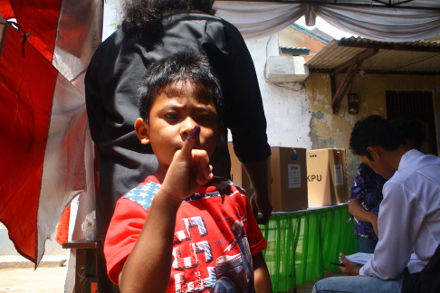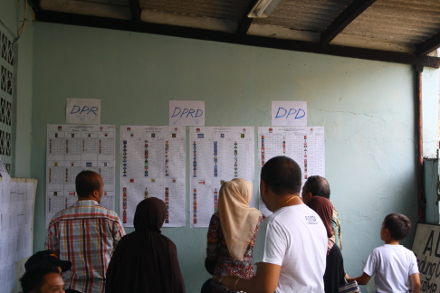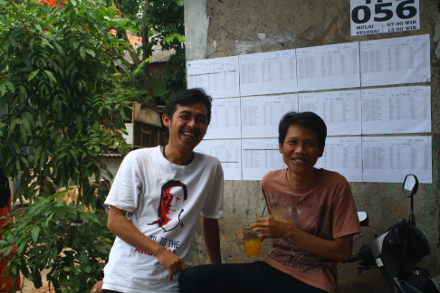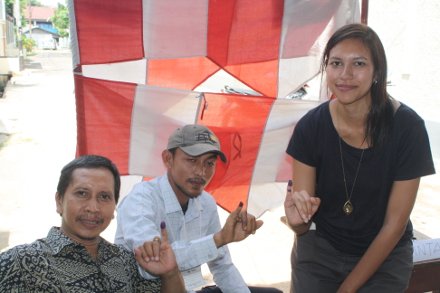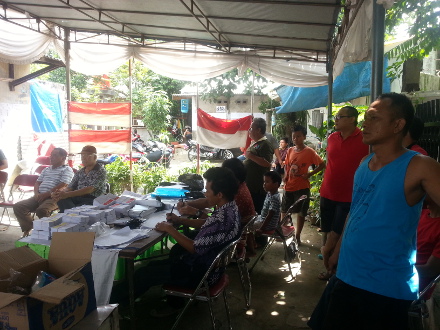Despite a smallish turnout, democracy is alive and well in a South Jakarta suburb known for the city’s largest cemetery, reports Elisabeth Kramer.
I arrived at the polling station in Tanuh Kusir, TPS 056, at 7am – just as the polling station was opening.
Tanah Kusir is a suburb in South Jakarta with an interesting demographic.
Literally ‘cemetery’ and named for the city’s largest graveyard which is only a few hundred metres away, the suburb was originally an area of government housing complexes and kampungs.
But there has been an increasing gentrification in the area over the last few years. Large, fancy houses are being built in place of older houses and the types of cars are changing; a 4WD Hummer has been roaming around the streets, rumoured to be owned by a government official.
The suburb also has a sizeable Christian population, mostly Batak. But like many other suburbs there are also several mosques and an Islamic school.
Voting starts
As local residents begin to stream past, I say a warm hello and some stop for a chat.
In contrast to 2009, when people seemed much more optimistic about their expectations, many seemed torn about who to vote for. Last time around, support for the Democratic Party was at an all-time high, but today people are subdued. The festival of democracy (‘pesta demokrasi’ as the voting is sometimes referred to) is not as boisterous as it was last time around.
People have been told that a golput (not voting) is a big risk, that if they don’t use their vote it may be co-opted by other, malicious forces. Moreover, they’ve been told that if they don’t vote they can’t complain. Many political parties have used this rhetoric to convince people to attend the polling booths today.
But this doesn’t necessarily make choosing a candidate any easier. The ‘Jokowi effect’ has had some impact, but while some are keen to see him as president, this hasn’t necessarily translated into support for PDI-P.
People express confusion over what the parties stand for and what the differences are. The arbitrary identification of parties as ‘Islamic’ or ‘nationalist’ still seems to guide many people in their decision.
Moreover, reports are that money politics hasn’t really touched the area this year. Residents were surprised that they hadn’t been approached with money like they had in previous elections. Some parties distributed cooking goods in the previous week, but that was as far as it went. This fits with other comments I had heard that many candidates shy away from using money politics in upper-middle class urban neighbourhoods. Where voters are more educated and more critical, they feel that trying to buy votes will do more harm than good.
Work and play
The polling booths become a local focal point for the day. The adjacent warung becomes a hangout for neighbours catching up and sipping iced drinks (it’s very hot). Children play in the streets while parents chat. Even local youths are hanging around, laughing and joking while playing on their mobile phones.
Sitting with neighbours, the changing nature of the suburb again becomes clear. When people who they don’t know show up to vote there are whispers about who they are and what they do. These people are new, not part of the neighbourhood clique. They are the ones living in the fancy new houses.
The voting itself goes smoothly. Electioneering is not allowed and there are no signs of this being breached. The party witnesses in attendance come in during the morning and get ready to approve the count. The officials do their job with diligence. There is time for joking, laughing and taking photos, but everyone seems committed to making sure that there are no problems with the vote.
The TPS is quiet for much of the day. There are 456 registered voters here. Later, after the polling closes, it seems 279 actually showed up. Around 40 per cent of those registered did not vote.
The neighbourhood head puts this down to the fact that many are registered as residents there but in fact live somewhere else and therefore can’t vote unless they come back for the day. Several members of my family fall into this category.
Counting the votes
After hearing many tales of miscounts, foul play and dirty tricks, I wasn’t really prepared for the professional and collegial counting process I observed. The party witnesses had developed a sense of community, looking out for each other when people left to eat, check in at home or go to the bathroom.
Not all parties send witnesses, but at this TPS it doesn’t seem an issue. The witnesses take their job seriously and don’t appear to be pushing their party interests too much. Indeed, apart from the observers from PDI-P and PKS, the others are not party people at all, instead hired workers paid just for that day. When voting ballots are counted the witnesses call out the vote for whichever party has won, regardless of whether it is their party or not. There are no disputes over votes and issues are resolved together.
Results
The results for the DPRD votes had PDI-P and Gerindra as the main contenders. However, the clear winner was a particular candidate from Gerindra who got a particularly high number of personal votes. Questions about his origin showed he had some family connections in the area, but nobody seemed to know too much about him.
Similarly in the DPR-RI count, the party that did best was PDI-P, which gained about 25 votes more than the second party, Gerindra. Voters were also much more likely to vote for the party rather than an individual candidate than they were in the DPRD election.
In terms of the DPD votes, the results were very close here too. The voting followed a clear pattern with the two main competitors being a Haji and a Batak Christian. The third-ranked candidate was previous a dangdut singer.
Many voters seemed particularly confused by who to vote for the DPD, not knowing anything about the candidates. Since candidates are not required to have political party backing, voters cannot even align them to a party which adds to the indecision. Rumour was, though, that the Christian candidate had contributed a significant donation to the local Protestant church and this may be what got him over the line in this area.
For each count there were also a number of votes that were ineligible (‘tidak sah’), either because they had been incorrectly marked (voters cast their vote by spiking a candidate’s name or a party with a nail) or because they were blank. In some cases it was hard to know whether these were deliberately ruined to nullify the vote or whether the voter made a genuine mistake. One observation I would make though, was the number of ineligible votes was highest for the DPD votes, a possible reflection of the fact that people knew very little about who they were voting for.
Reflections on TPS 056
One of the most striking things about the voting and vote count was how smoothly it all went. There didn’t seem to be any dodgy dealings and everyone did their jobs. Official party witnesses left happy with the process. Local residents sat and observed the count as well and when it was all said and done there were no rumblings of dissatisfaction with any of the count.
Whether this is reflective of other TPS across Jakarta, or indeed across the country, is very hard to know. TV and social media reported incidences of vote-buying in other places and personal anecdotes of vote miscounting and misconduct were common. Rural areas, especially, are often identified as the main sites for vote-buying and election misconduct, lacking oversight and more susceptible to political interests. It may, too, be a reflection on the socio-economic stature of the neighbourhood, comprised of comparatively well-educated and well-off residents. The neighbourhood has never been a ‘safe’ seat for any party, and many identify themselves as what we would call ‘swing voters’ based on who they think will best govern the country.
The other key point to note was the percentage of voters who did not show up. Fears of high levels of golput were evident in the government campaign push leading up to the election, encouraging people to show up, and also in the rhetoric used by political parties themselves. Several times in the campaign period I heard candidates ask voters not to golput, no matter who they plan to vote for. I’m not sure whether the high non-turnout levels here were mirrored by what happened across Indonesia, but the voting system, which currently forces residents to vote in the place where their national ID (KTP) is registered, is clearly a barrier to increasing voter attendance.
…………………
Elisabeth Kramer is a PhD candidate at the University of Sydney studying anti-corruption rhetoric in the Indonesian parliamentary elections.
 Facebook
Facebook  Twitter
Twitter  Soundcloud
Soundcloud  Youtube
Youtube  Rss
Rss 
